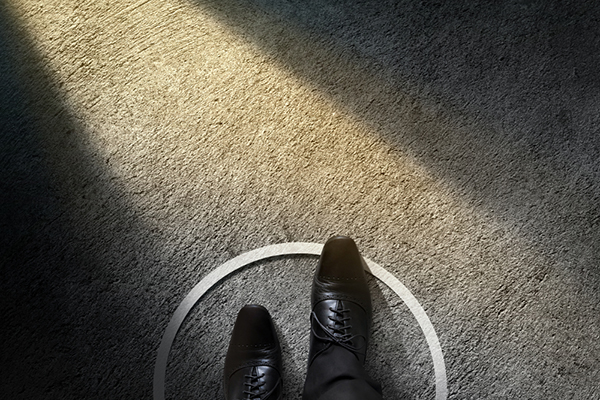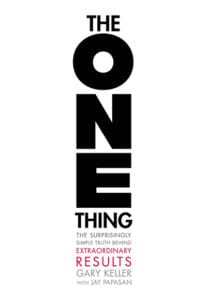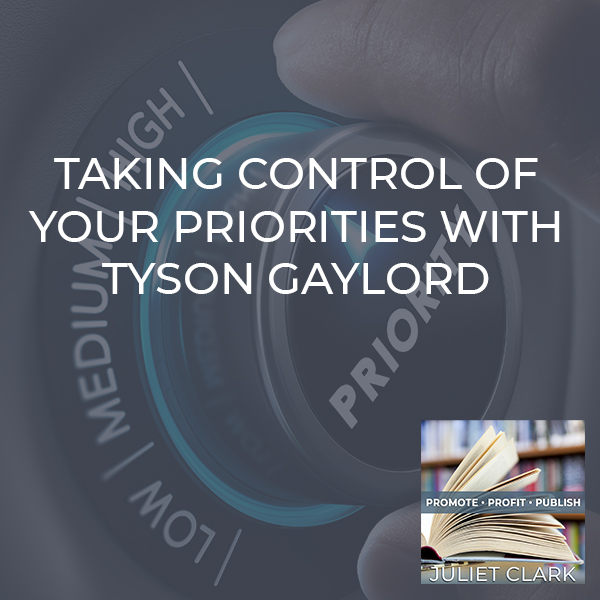
With so many things to accomplish every single day, taking control of our lives is slowly being dragged to the bottom of our priorities. We are so busy ticking off boxes that we forget to understand our purpose and values. Juliet Clark talks to Tyson Gaylord about the right way to put our lives on a pause, review our goals, and regain our role in steering the wheel. They share tips on how to set daily priorities, when to cut off ties with people who contribute nothing to your growth, and the art of saying no. Juliet and Tyson also discuss the dangers of social media addiction and how the sound of a single notification bell can disrupt your momentum.
—
Watch the episode here
Listen to the podcast here
Taking Control Of Your Priorities With Tyson Gaylord
Before we get started with our guest, I want to remind you to go over to YouTube and follow us, get yourself subscribed over on YouTube at Superbrand Publishing. All the recordings. If you’re listening over on a podcast, you can see all the videos over there. I promise they’re real people not blow up dolls, not stick cardboard people. They’re real live people. If you’re a visual person, that’s the place to go. Don’t forget to take our Promote Profit Publish Quiz and find out where your skillset lies and are you ready to publish? You can find that at www.PromoteProfitPublishQuiz.com. Our guest is Tyson Gaylord. Tyson’s mission is to help you learn, grow and transform your life.
He has spent several years falling on his face, dusting himself off and trying again. That is the nature of a true entrepreneur because we all get frustrated and we go, “I’m never doing this again. I’m getting a job tomorrow.” We go and drink or sleep when we’re upset, and we start all over the next day. Over the years, he has learned to read, take many classes on achieving the life he wanted. He also has a show. The mission is to train your mind to adapt to any circumstance. The goal of the show is to help you learn, grow, transform into the person you want to become. In each episode, he talks about a specific topic designed to help you train your mind to adapt to any circumstance. He also talks about guest appearances, topic related book recommendations, weekly challenges and monthly giveaways. He’s got a lot going on his podcast as well. Welcome, Tyson.
Thank you for having me, Juliet. It’s been an honor. I was tempted to quit and find a new job.
Aren’t we all? Every day. I know there are a lot of entrepreneurs that listen to this show. You also write books, and you have a podcast so we you know what we’re talking about when you have those tragic days where it’s like, “I’m done. I want a paycheck.” What happened? Do you want to share what happened?
I was frustrated with things. Your mind goes places sometimes and it seems like, “What am I doing?” I was frustrated a couple of things going on personally, family and whatnot. I was like, “It’d be easier if I got a job and everybody’s left me alone and it’d be much simpler.” A lot of people work from home so more people can relate to it. I’ve always worked from home for many years, I’m used to it. People can relate in the fact of when your family sees you, they think you’re off and you’re home and you can hang out. It’s frustrating. sometimes I’m like, “Between 9:00 to 5:00, I got work. If I was on office, you couldn’t bother me.” That stuff sometimes gets in your head and it’s like, “I want to go away.”
Part of the problem too, is that more and more people are staying home, they have their own businesses. I always talk about, “You don’t know how much is involved online.” When you quit your job or you start that new online, the first day, you’re in your suit, you’re excited, you’re ready to go, you think you’re going to work 9:00 to 5:00, and then by about month four, you are unshaved, you’re un-showered, your harried and hopeless, the dog is looking at you going, “Shower, please.” Especially with COVID, there’s a lot to adapt because people are doing this for the first time and realizing it’s hard.

Taking Control: If you can narrow down the one big thing and focus on that, it helps things flow and get you into the zone.
It is easy to start the laundry, go make dinner, find something on Netflix, take an extended morning break. It’s easy to get distracted.
Not only that, I find when I’m procrastinating, you could eat off my floor. What strategies do you have to help some of these people with those kinds of distractions that are going on at home?
The biggest thing is knowing what your priorities are, what are the 1, 2, 3 max things you’re going to accomplish? If you did this one thing, that would make your whole day, everything was worth it, waking up, turning on a computer, everything was worth it, knocking that thing out. If you can identify that, that’s the hard part, we get bogged down and somebody says, “It’s hard.” You’re like, “If I do this other thing, let me check my emails.” Yu don’t get to that thing. At the end of the day, you’re like, “Another day has gone by, it’s already Thursday?” If you can narrow down the one big thing and focusing in on that, it helps things flow and you get into the zone and when you knocked it out, you feel good about yourself. You feel good about everything going on and you get that momentum. It builds and it goes in it and it flows. That’s the thing. I noticed too, when I’m done with that thing, or which one do I want to do next, when I do that procrastination, I start looking for things, I’m like, “There’s a couple of chores around the house or something. Let me do this little thing.” That’s what I found.
Brian Tracy has this great book called Eat That Frog!, it’s always put that thing that you’re avoiding on your list and knock it out first and you’re home free. I love that because then I doesn’t give me a chance to procrastinate. It sounds you have the cleanest house, the cleanest yard. You know too like I do that, “I’m procrastinating, help me.”
Another good book on that topic is, it’s called The ONE Thing by Gary Keller. It’s not about real estate, but that was what turned around his business and his life was focusing on that one thing and not being distracted, not trying to tackle too many things at once. That’s another great book on that subject.
I sold real estate many years ago. Those people who work with coaches, that block of time, that first thing in the morning is your prospecting time because that’s that one thing that prospecting is what real estate agents hates. Who wouldn’t? That’s another entrepreneurial thing you have to learn how to deal with is “no” and not letting “no” ruin your day.
It’s a skill. We got to get comfortable with it. We don’t have to be fragile. It’s not personal and we can’t take it personally.
Be comfortable in saying no. Share on XNot only that, we have to let go of the outcome too. When you’re able to say, “That wasn’t meant to be.” I’ve had a client say no and I’m like, “I needed that money, but I guess it wasn’t meant to be.” An hour later, I have a brand-new client that comes in that I didn’t expect. Do you have strategies when you help your people? When “no” is not a good thing and they let it ruin their whole day, how do you overcome that?
I like to start with what is in your control. You don’t have control over anybody’s thoughts, feelings, what’s going on in their life, what’s going on their business. Worry about what you can control, the product you’re offering, the service you’re offering, the best experience you can offer. What can you control? What is in your absolute control? Focusing on those things and get back to that, it helps people understand. There are so many people in this world. We spend a lot of time chasing out people that don’t want anything to do with us. We need to learn to let go.
Knowing where that threshold is, maybe building up a system or something for you and your business. “I’ve gotten a lot out of this person. I tried. I wanted to help.” It’s got to be a genuine thing, if you’re trying to get money out of people, it doesn’t work out too well. You got to let go of that and understand there’s a lot of people in this world. Potentially there’s 100, 1,000, 10,000, and maybe 1 million people that could use your service or product or whatever it is and go find those people, never mind the guys that don’t want it or don’t have anything to do with you.
A quick example, I was talking with a therapist, substance abuse or something along those lines. She was like, “How do I help thousands and millions of people?” I’m like, “How many people do you need to help in your lifetime? One hundred?” One hundred people a year give you $200. That’s a good life. Can you focus on getting 100 people this year to help and get into therapy instead of worrying about a million people? That’s a different objective. That’s a different budget. That’s a different lifestyle. Different thought pattern. If you don’t know how to get one person, getting 1 million is hard. It helped her say, “I could have a good life if I helped 100 people.” That’s attainable. Kevin Kelly, he’s a founder of Wired magazine, he’s got a great article, it’s called 1,000 True Fans, go to KK.org and search 1,000 True Fans. You’re able to hone in on that concept.
When you let go with the money piece, things start flowing. We get that you need money. It’s not like you should be a nonprofit. Be that person who charges and cares versus those ones out there, remember a years ago, when everybody would go to a webinar or they’d click on something that was $2,000, easy buy, but those people didn’t deliver anything. That’s how you increase business, is that giving piece.
Delivering more than the person has paid for. It sets you up for a future. You can’t expect that. You can’t pay for marketing, it’s not going to help. You’re always over-delivering in that manner and people are going to know like, “When I pay Tyson $10,000, I’m getting $12,000, $15,000, $18,000, $20,000, $30,000 worth of work.” That is going to translate to a lot and people are going to understand the value that you provide, whatever services you’re providing.

Taking Control: We spend a lot of time chasing people who don’t want anything to do with us. We need to learn to let go.
You have to always remember too, when somebody signs up for your program and they fail, they never say, “I didn’t show up for Tyson’s program.” It’s always, “He sucks.”
To take it a step further, analyzing those losses and saying, “Is there a system that I didn’t put in place to help these people? Is there a way that I should have been reaching out or some type of follow up? How did I not serve these people?” Maybe that person was a type of person that’s like these course hoppers and types of things. Back in the day, we always go to these conference things, all the times always have them, all the time free, those free things. I remember going to those, trying to figure out what was going on in my life. I see the same people at the real estate conference, I was at the vending machine conference, I was at this conference and hopping around looking for something to do.
You have to remember when you go to those conferences, one of the things we know from our quiz taking practices is that 80% of that room has no motivation. They will never pull the trigger. It’s important that when you’re seeing those people over and over, you have to ask yourself, “Are those the action takers?” Talk to them and find out, or they just go.
How are you guys addressing that 80%? What does that like?
That 80%, we don’t sell anything to. They go into our list, we give them good content, we hope one day they’ll step up, but we focus our time on those action takers, because those are the people who were saying, “Yes. I want to improve. I want to take action.” I used to see this all the time at real estate conferences when I did sell many years ago. The same people would go all the time, but they wouldn’t do anything. They’d be hyped at the time. You’ve seen this.
Come Wednesday, the motivation’s gone.
You have to be invested when you’re saying about everybody you have to be invested in those people who are the action takers.
Worry about what you can control. Share on XWe spend a lot of time on the 80%, how can I get this 80% versus this 20%. They get neglected because they do their things and they do their stuff, but how much better can we serve them? How much more can we sell them or how would we find more of those people? That’s where a lot of salespeople don’t spend time on.
If you’re spending your time on that other 80% trying to convince, and any time in sales you’re convincing, you’ve lost, but if you’re spending that quality time with that 20%, those people are going to pass, they’re going to do well and they’re going to give you referrals. One of the things that we do is we offer all of our clients like, “You’ve been through our program, you’re our best people to go out and shout about it.” We offer them to be referral partners.
They’re going to be a champion for your brand and there’s no amount of money that’s going to be able to replace that.
How do you handle those people who purchase and then don’t step up?
I don’t have an answer. I don’t know. I try to talk with you, and I try to help, and I try to do some stuff. To me, it’s person to person, but you got to come to a point where you’re not in it, “I’m sorry.” You got to cut ties and you got to go on with life. Sometimes a friend or somebody you’re close with, or a friend of a friend, you spend a little too much time with that person and you sucked down, you go and neglect everybody else. It’s knowing when to cut ties and it’s not just businesses, sometimes in life too, sometimes you got to cut ties with your friends and family that are dragging you down. It’s the same premise. It’s tough, especially if you’re a giver or you want everybody to succeed, but you got to set up some type of principles or boundaries or rules and say, “When I get to this type of threshold or this feeling, cut it off.”
You bring up boundaries because you work with a lot of people on a personal basis as well. Do you find that people who get better with setting boundaries in their personal life set better business boundaries?

The ONE Thing: The Surprisingly Simple Truth Behind Extraordinary Results
I would have to think so. When you respect these boundaries, you respect these cutoff times and you respect these things, you’re setting a precedence for, “I respect myself. I respect my time, I respect you. We’ve got other things to do and I want to be fresh tomorrow for the next people. I want to get a show up. If it’s 3:00 in the morning and I’m helping you because I have no respect for my sleep, I’m not going to show up tomorrow for my family, for myself and for my other clients.”
What experience have you had with that? If there’s something you can share. I do think that’s super important, the boundaries, because if you’re not adhering to those boundaries, it takes it out of you, but it takes it out of your other clients too so you’ve got to get good with that.
I’m strict with my cutoff times for the day. I will block my calendar out in advance. I blocked off Christmas break and I bought their spring break and all that’s already blocked off my account so I cannot schedule anything like that and I respect that and I let people know. In the summertime, I don’t work on Fridays and I let everybody know in advance, this is my family time, this is the day I’m going to go and if you don’t like it, I’m sorry. I don’t mean to be rude. I don’t care.
Summer for my kids, six weeks, six Fridays. Nobody’s hopefully going to die, and I’m not be going to help you. It’s tough, if you already set a precedence, it’s hard to go back on it, but you’ve got to do it. I set my phone up and automatically shuts off at 7:00 PM. You can’t get ahold of me unless you’re my immediate family. I don’t have notifications my phone. I don’t have notifications on my computer. I schedule as much as I possibly can. I don’t always stick to it, but at least it’s in my calendar, it’s scheduled and it’s such as me, if I have my boundaries set up, if I have my things set up and letting people know. I had to let a client know, I was like, “I’m sorry, it’s the end of the day, I will get back with you tomorrow.”
It’s a good client of mine for many years. As I let her know, “I’m sorry, it’s the end of the day I have to go do things.” It’s tough. If you’re the type of person that has already set this precedent, you’re the guy that answers their email within a minute. You’re the person that always gets back to the text messages. You’ve got to reclaim that and suddenly people know, “I know I’ve always been a guy that would email you back at 3:00 in the morning. I’m not going to be that person anymore. I’m sorry. At 7:00, from now on, I’m going to do this. This is my business hours.” Whatever you got to do to set that up and start to adhere to it and stick to it.
You can change people’s behavior. It doesn’t take much to change the behavior. Set up automatic email reminders. Tim Ferriss has got some good stuff on this and setting that up, that’s why I learned a lot of things from him and I took it into practice, but it starts with you and start pushing it out to your other people. You’re going to lose clients and people because they don’t respect themselves or maybe they don’t respect their time, or they don’t value it, and that’s okay, we can move on and you’re going to live a happier, better life.
It doesn't take much to change behavior. Share on XI do take Fridays off. That’s one of my things is I go golfing with my girlfriends. We’ve got all winter. If you want a book, book during the winter, because it’s snowing here and I don’t play golf, but I love that to choose, set it aside and it is what it is and you have to live with it. If you set those expectations up front with your clients, then they know. All of my clients have my phone number, but I tell them, “If you text me, give me 24 hours because I may be doing something.” You have to make weekends sacred too. You need your rest and to get back, rejuvenate, re-energize.
As an American society, we take this recharge for granted. “We can charge on it. I can sleep for hours. I can do all this stuff.” The science is clear. We can’t charge for it. We’re not a sharp, we’re not able to solve problems. When I have a fluid conversation, our thoughts are staggered. If we’re not sleeping, we’re not relaxing. We’re not recharging. We’re not able to be bored. We have this problem with not putting down our phones and we’re constantly have to have stimulation and you don’t allow your brain to relax and to solve problems and to unwind them. It sets you up to be in a bad place forever. You’re constantly stressed. You’re constantly here and it’s a constant state your body doesn’t want to be in and shouldn’t be in.
If I don’t get my seven hours, I’m grumpy.
It’s good that you can recognize that instead of saying, “That’s how I am,” versus saying, “Why am I this way? Why am I doing this? How can I be this other person?” When you realize, “If I don’t get eight hours of sleep, if I don’t get a workout in.” Whatever it is that makes you run and take and get your body moving, we come up with excuses and we set ourselves up for failure.
What else can you give us tip-wise about something we could do to improve what’s going on in our business?
Turn off your phone. The reader, if your phone dings, beeps, are you going to stop everything you’re doing to check it? I guarantee most people are. What’s happening here? I’m in the middle of whatever, sending out an email, setting up a course, getting ready to prepare for something, putting together my TPS report and guess what happens? Something dings, “What is it?” Who knows? “I’m excited now. Somebody likes me. Somebody loves me.” What’s going on? “Somebody liked my Instagram posts. Great.” I’ve killed everything happening in my brain. I’ve killed all my momentum. I’ve killed everything happening that’s going on. Research shows 20, 25 minutes to get back to where you used to be from that one little interruption. Imagine if all day long, say once an hour your phone is dinging at you and you got five minutes there, plus 25 minutes to get back to where I used to be, that’s 30 minutes.
I’m back where I used to be 30 minutes ago. Hopefully, I got 30 minutes before somebody bothers me again to be focused. Over half of your day is gone. It sounds trivial. We have this unhealthy addiction to our phones. I don’t know how many people like, “I’m checking for notifications.” “Are you crazy?” “Put your phone down.” “You’re out of your mind? Why would I do that?” That’s addiction. If I had a beer in my hand and I refuse to put it down, you would take me to rehab. If I had a bag of cocaine and I could not live without it, you would take me to rehab, but because it’s my phone, we don’t have that same viewpoint on it. I’ve seen people furious for taking their phone away, it’s mind boggling.

Taking Control: Sometimes, you got to cut ties with your friends and family who are dragging you down.
Even getting your kids turn it off at dinner. It’s the arguing.
It’s tough, especially girls. I’m not sure if you’re aware of the research number that suicide rates are off the chart with girls because of social media, dysmorphia and all these types of things, people are having plastic surgery to look like filters. It’s bad. There’s some research and talk about, especially with girls, girls are naturally susceptible these types of social things. There’s talks about it’s cool to be transgender, “While my friends are transgender, I must be too. If I do this, then people like me and I get praise.” There’s a lot of children out there that are destroying their lives with these types of things and it’s sad. For those types of reasons, I don’t want my kids on it. It’s hard enough versus adults to function with a phone and these children that don’t have fully formed brains, they’re susceptible to a lot of things, a lot of deception. It’s tough. I’d rather opt out.
Do you have Netflix?
I do.
Have you watched The Social Dilemma?
I haven’t watched it. No.
When you respect work boundaries, you also respect cutoff times. Share on XWatch it. They talk about a lot of the things that you did, and it’s an interesting documentary. Everybody needs to watch it that’s on social media. I got kicked off of Facebook. I had 4,800 friends, I was on it all the time and I was upset for about a day and then I got back on. I’m using my full name instead of the other. I have few friends and I hop on little anymore. The Social Dilemma came up, there was another thing about how they’re using social media with information warfare to divide us. I feel I’m off, but those first couple of days, it felt like an addiction. I was angry that I got kicked off and I was like, “What is this all about? It’s not that big a deal.”
Several years ago, between Christmas and New Year. I did a one week experiment. I was like, “I got to delete all the stuff on my phone.” Everything I could delete, gone. The first few days is it’s this addiction, you are grabbing it and going, you’re standing in line somewhere and it’s going, you’re at a traffic light and you’re looking. I’m not a big social media person, but it’s a habitual thing of looking and seeing. After I deleted that stuff and after the week was over, what do I put back? I put back nothing. It’s been freeing. It’s been so great. Sometimes I’ll schedule time to go on the web version and look all the messages I have, let’s go down here. It’s fun and interesting, but the amount of time you free up and the different things you free up, it’s amazing.
Right before the election in 2016, I jumped off Twitter. I got on in 2008 because it was where authors were, but it had gotten so toxic. That’s what I feel about Facebook too. I don’t do anything but LinkedIn for the most part and that’s because it’s business-related.
That’s going to change soon too.
I hope not. It’s the one place you don’t see political stuff.
It’s already changing a bit. I don’t know if you’ve seen, but every time you go on Facebook or Instagram, even Google, it’s all about making track, “I’m going to vote.” I don’t think it’s your business.

Taking Control: Turn off your phone to avoid distractions that could mess up your momentum.
It’s not only that. They only want you to vote one way. Serious people are already and have been and voted in every election. Tyson, where do we find you if we want to find out more about you?
Go on to LinkedIn.com/tysongaylord. You can connect with me there. You can search for me. You can search for the social community and show, find out everything I’m up to.
Thank you so much for being a guest. I hope you guys will love this conversation because we revealed why you should be on social media anymore. Thanks
It’s okay to use social media, schedule the time and use it responsibly.
Thanks Tyson.
You’re welcome.
Important Links
- Superbrand Publishing – YouTube
- www.PromoteProfitPublishQuiz.com
- Tyson Gaylord – LinkedIn
- Eat That Frog!
- The ONE Thing
- KK.org
About Tyson Garland
 Mission Training Your Mind To Adapt To Any Circumstance. Our goal is to help you Learn, Grow, and Transform into the person you want to become. In each episode, we talk about a specific topic designed to help train your mind to adapt to any circumstance. As while as guest appearances, topic-related book recommendations, weekly challenges and monthly giveaways.
Mission Training Your Mind To Adapt To Any Circumstance. Our goal is to help you Learn, Grow, and Transform into the person you want to become. In each episode, we talk about a specific topic designed to help train your mind to adapt to any circumstance. As while as guest appearances, topic-related book recommendations, weekly challenges and monthly giveaways.Love the show? Subscribe, rate, review, and share!









Leave A Comment